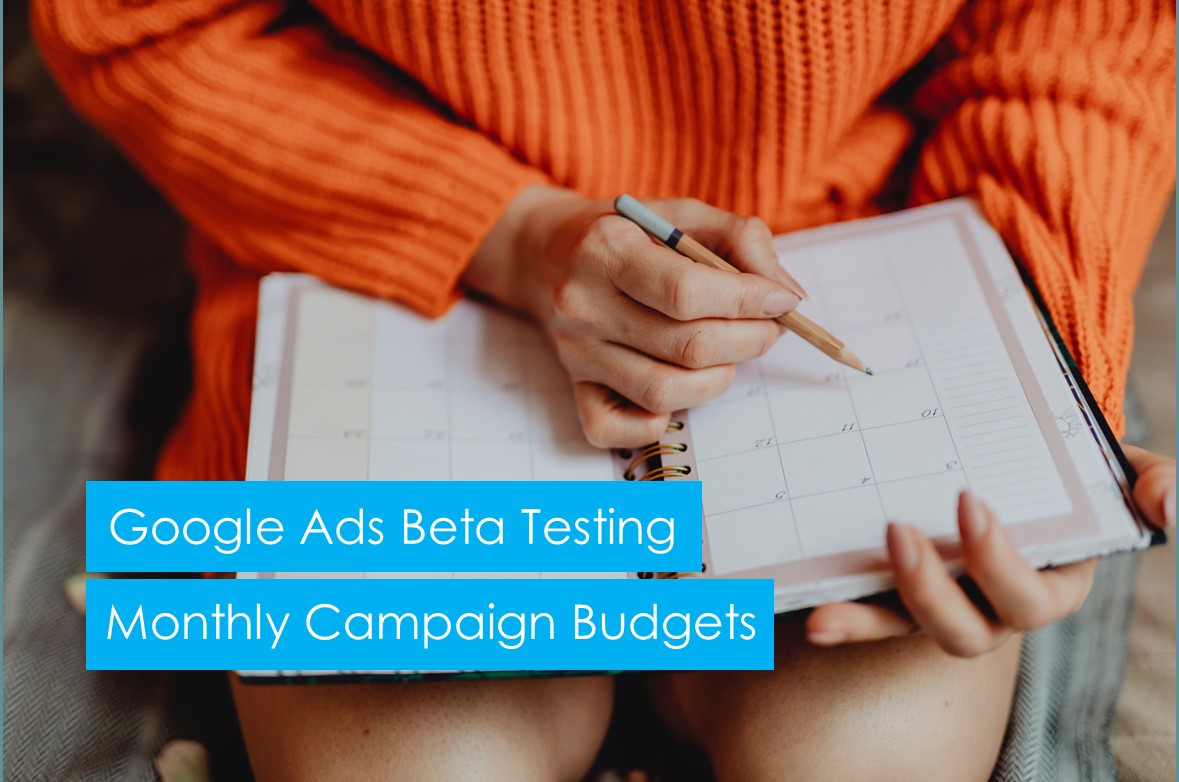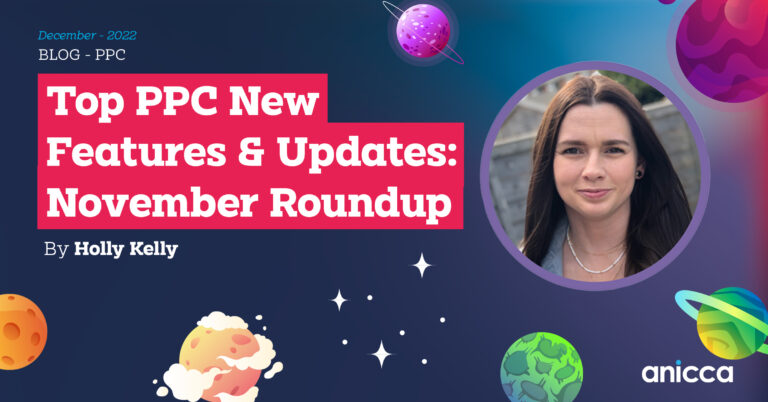New Google Ads Monthly Campaign Budgets
Google is currently testing a new feature that allows you to manage your campaign budget by setting a maximum monthly budget as opposed to just the regular option of using a daily budget.
Upon selecting ‘month’ budget, Google will automatically multiply your set daily budget by 30.4 to give you a new monthly budget figure. In my example below, my campaign daily budget of £2.00 is multiplied by 30.4 to give a new monthly budget of £60.80. This new monthly budget is tied to the current calendar month you are advertising within, so it adds control to your ad spending.
By giving account managers the option to choose between an average daily budget and a monthly budget, Google Ads is likely trying to erase the confusion that often arises when advertisers notice the fluctuations in their daily spend which currently can overspend by 2 times.
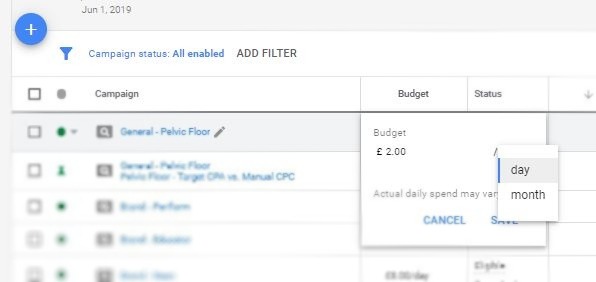
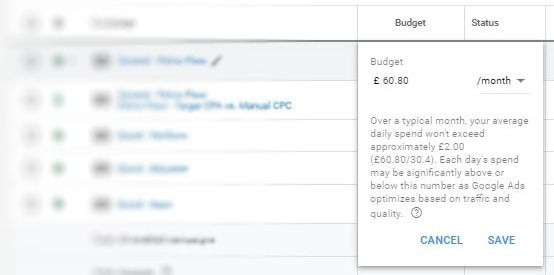
The noticeable increase in the budget figure amount is explained whilst making the change to a monthly budget with this description of how a monthly budget will operate: “Over a typical month, your average daily spend won’t exceed approximately £2.00 (£60.80/30.4). Each day’s spend may be significantly above or below this number as Google Ads optimizes based on traffic and quality.”
The option to use a monthly budget is also visible within the Settings tab at campaign level:
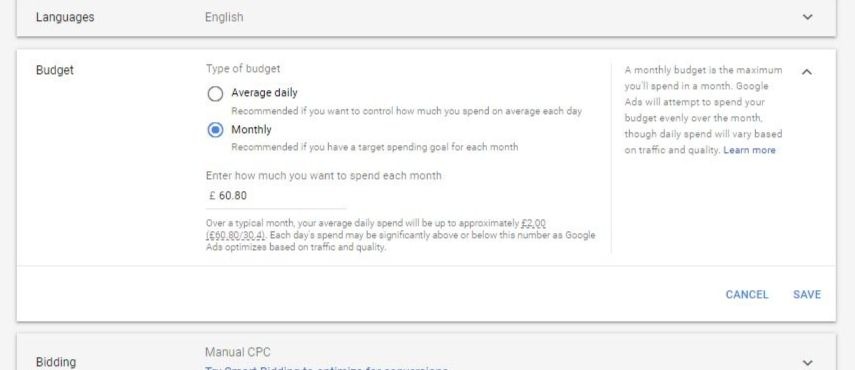
Is a monthly budget a better option?
Ease optimisation for account managers?
Many account managers who work on multiple accounts could see this help to ease the effort needed in managing the budgets of campaigns. A lot of clients that I work with assign monthly budgets for campaigns, which means throughout each month you need to regularly check the pacing of the spend, to ensure spend gradually reaches the intended overall monthly budget.
The use of monthly budgets may begin to solve this issue, Google has claimed that the monthly budget you assign is ‘the maximum you’ll spend in a month’ meaning that you should be able to leave your campaign alone with the expectancy that it will not overspend. I was imagining when first seeing this new budget type that Google would be able to marginally overspend the specified amount, but if this is not the case it could be hugely useful to account managers. If spend capping is not guaranteed then account automation in relation to capping spend will be required for clients with strict budgets, in order to manage account budgets in this more ‘hands-off’ approach.
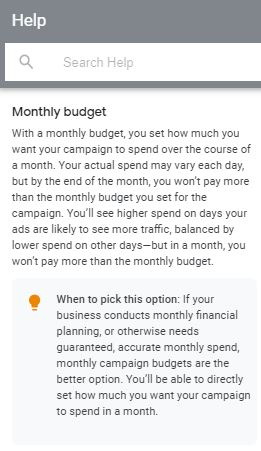
Easier for businesses?
The idea of monthly budgets potentially better aligning with the financial forecasting undertaken by businesses is re-enforced further by this interesting snippet I found whilst delving into Google Ads’ help section, to uncover what I could about monthly budgets:
The highlighted paragraph explains that monthly budgets should now be considered the better option for ‘guaranteed, accurate monthly spend’, which we all know to be desirable to all businesses when it comes to planning expenditure. Whether this is because monthly budgets will actually help Google to better understand and manage how much you want to spend in a month for a campaign, through functionality such as your monthly budget being the max you can spend, and help the spend to come in at close to the assigned budget (compared to calculating these figures in daily amounts), or if it just adds a layer of clarity that allows you to easily assign a clear, visible monthly budget we will have to see.
Implications of changing monthly budget mid-month
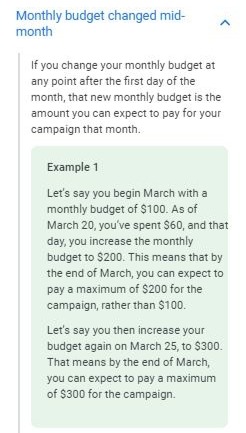 In relation to easing the management of campaign budgets over a month, it needs to be considered that if you were to set a monthly budget and then decided to change the amount you wanted to spend in the middle of the month. The current use of daily budgets is quite flexible for this type of change;
In relation to easing the management of campaign budgets over a month, it needs to be considered that if you were to set a monthly budget and then decided to change the amount you wanted to spend in the middle of the month. The current use of daily budgets is quite flexible for this type of change;
After looking in Google Ads’ help section, it is clarified that if a budget is changed within a month, whether it be on the 5th or 25th day of the month, the daily budget adjusts inline with your monthly budget to keep you within your monthly budget cap.
This could be useful when working with clients who like to change their campaign budgets in relation to their business performance, as it means that mid-month budget increases/decreases can be implemented in an easier fashion and are clear at a quick overview of the account. This will also mean that account managers will be busy on the 1st of each month, ensuring that all campaign monthly budgets are set to the correct amount relevant to the upcoming calendar month.
Handing over even more control to Google’s algorithms
This new option of monthly budgets in many ways seems to follow suit with the changes we have experienced in other areas of Google Ads, a move towards automation being involved in all aspects of account management.
The description of monthly budgets explains that it will enable Google to ‘optimise’ the amount spent each day, which will be added to the existing ability of Google’s algorithms to impact scheduling when using automated bid strategies, by impacting spend during each day. This can be seen as a benefit as you can now further tap into the power of Google’s machine learning, which theoretically should be able to far outperform any account manager in optimising ad delivery. It also means that with Google taking a larger role in optimising spend and ad delivery during the month, it should begin to leave account managers additional time to focus on other areas.
The other question this makes me ask is, will campaigns with low monthly budgets serve adverts every day? If Google is optimising the delivery of spend over a month it may mean that insufficient budgets lead to adverts not being served on every day of the month, the same could be done if it was evaluated that it would be better for performance to preserve budget on certain days and over spend on others. This may mean that through using a monthly budget your scheduling data will be full of lots of insights as to when it is most effective to run adverts in a month period. This will soon be better understood through testing.
Control over pacing of spend
One of the only issues I can see with monthly budgets on face value, is that it could take away some of the abilities that account managers have to influence the spend on a day to day basis, which can be useful when promoting a sale or looking to reduce spend for a period of a few days. For example, will monthly budgets mean that when November rolls around we will just have to trust that Google understands which days Black Friday is, and makes relevant budget increases to make ad spend available for promotional periods such as this.
If this was considered in relation to promotions that aren’t calendar specific (e.g. you decide to launch a sale for your business) Google may have less signals to understand how you would like your monthly budget to react, so account managers may need to begin re-thinking how to manipulate monthly budgets in these scenarios, or will briefly changing back to a daily budget be better for managing these periods?
Conclusion
It seems unclear at this point when monthly campaign budgets will become available across all accounts, as I have only found it in one account myself and I’ve not been able to find much news or commentary about the current stages of testing. However, based on how the use of monthly budgets will allow Google to further aid in the management of campaigns, and that monthly budgets do seem to better align with businesses financial planning (compared to assigning daily budgets), I would expect monthly budgets to become more of a norm in the years to come, although I think it is likely that advertisers will desire the option of both for achieving different goals in relation to different campaign types. It does not seem likely that Google will remove campaign daily budget setting, so for now this is a nice alternative that is currently being tested in beta.
To find out more about the methods discussed in this blog or to just get some honest advice about PPC advertising please contact us at Anicca Digital.

